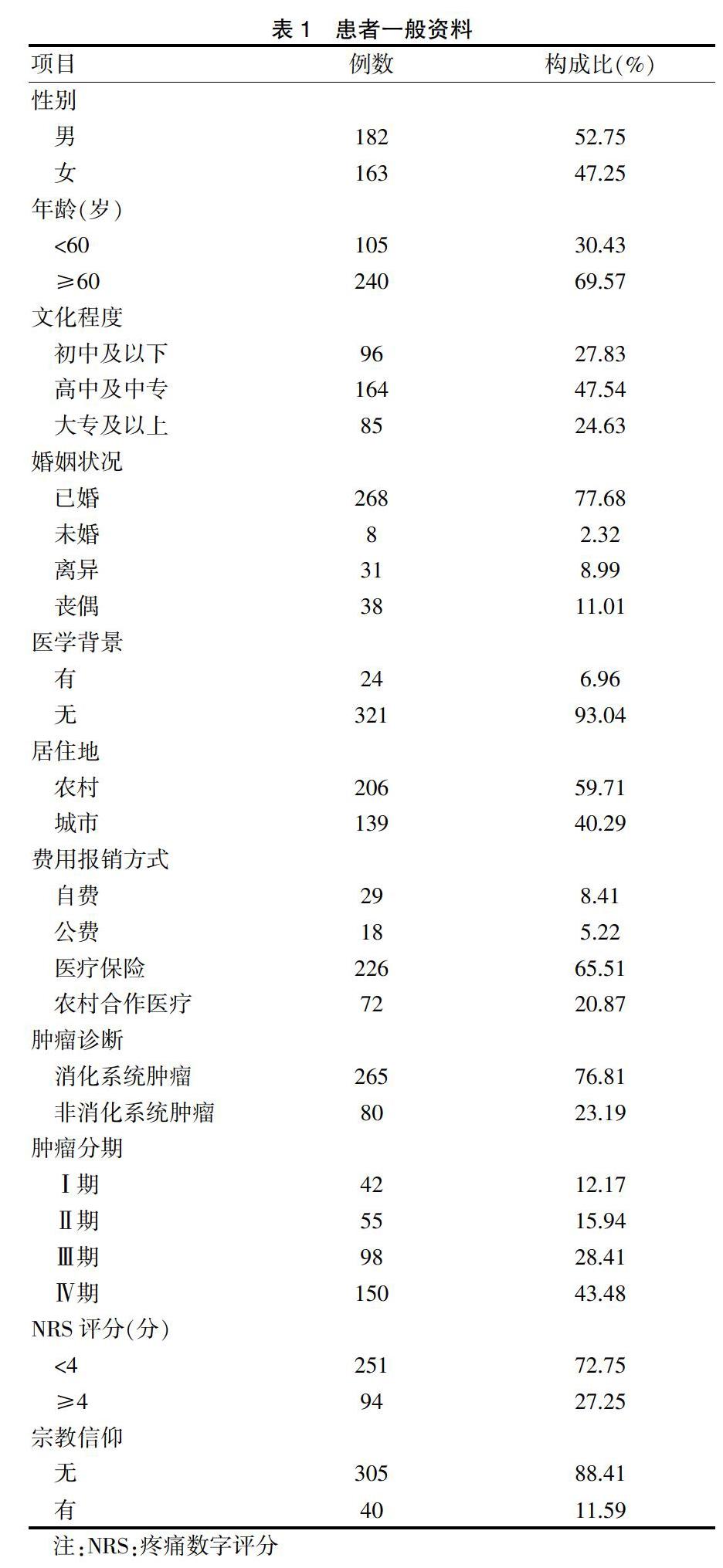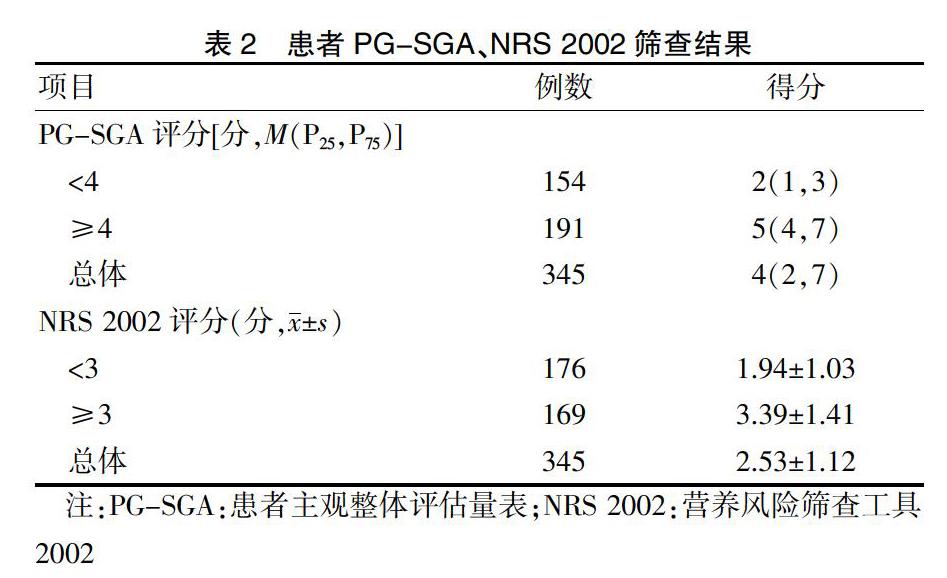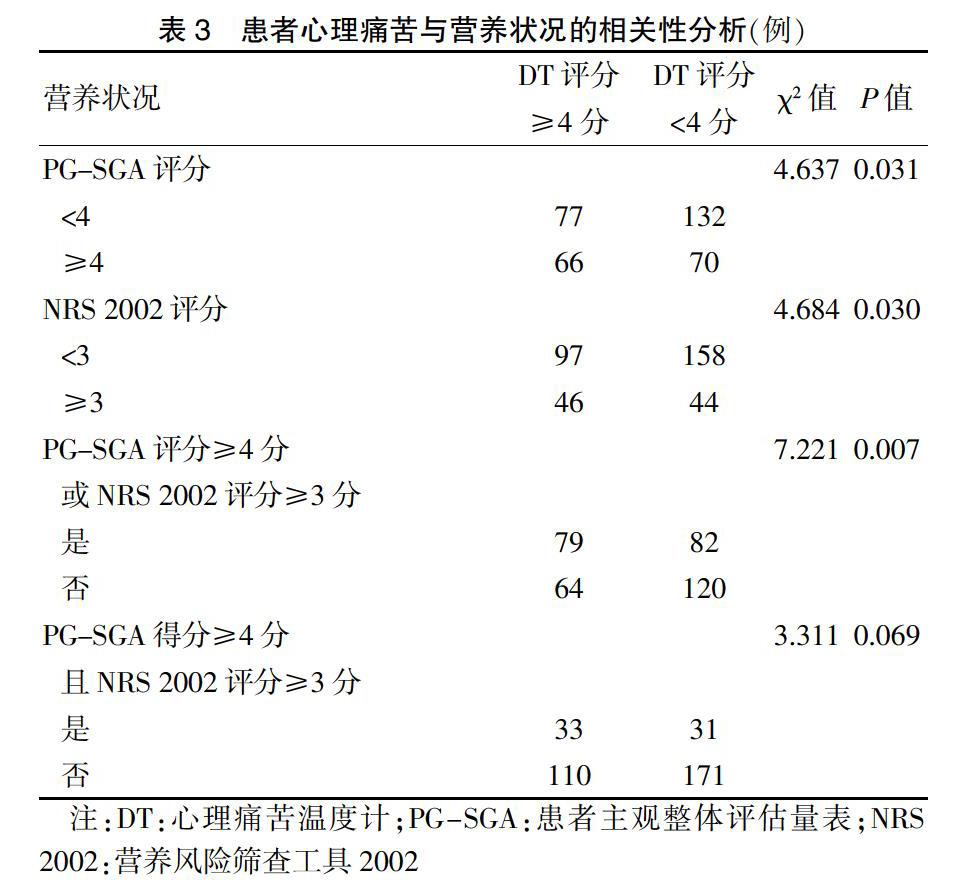恶性肿瘤患者营养不良与心理痛苦的现状及其相关性
张萍 赵云 孟爱凤 王叶苹 王梅香 吴冰 羊波



[摘要] 目的 調查恶性肿瘤患者营养不良与心理痛苦的现状,并分析两者的相关性。 方法 采用便利抽样法选取2018年4月—2019年1月在江苏省肿瘤医院住院的恶性肿瘤患者352例作为研究对象。应用一般情况调查表、心理痛苦温度计(DT)、患者主观整体评估量表(PG-SGA)及营养风险筛查工具2002(NRS 2002)进行调查,分析营养不良与心理痛苦的相关性。 结果 本调查共发放问卷352份,回收有效问卷345份,有效回收率为98.01%。患者心理显著痛苦检出率为41.45%。PG-SGA及NRS 2002量表筛查出营养不良发生率分别为55.36%、48.99%。PG-SGA、NRS 2002得分与DT得分呈显著正相关(P < 0.05)。平行试验显示,两者存在显著相关性(P < 0.01),但在连续试验中,差异无统计学意义(P > 0.05)。结论 恶性肿瘤患者营养不良与心理痛苦水平呈正相关,将来可考虑开展以食物为基础的营养干预来改善患者的心理状态。
[关键词] 恶性肿瘤;营养不良;心理痛苦;相关性
[中图分类号] R473.73 [文献标识码] A [文章编号] 1673-7210(2020)09(c)-0070-04
Status and correlation of malnutrition and psychological distress in patients with malignant tumors
ZHANG Ping1 ZHAO Yun1▲ MENG Aifeng2 WANG Yeping1 WANG Meixiang2 WU Bing1 YANG Bo1
1.Department of Analgesia, Jiangsu Cancer Hospital Jiangsu Institute of Cancer Research the Affiliated Cancer Hospital of Nanjing Medical University, Jiangsu Province, Nanjing 210009, China; 2.Department of Nursing, Jiangsu Cancer Hospital Jiangsu Institute of Cancer Research the Affiliated Cancer Hospital of Nanjing Medical University, Jiangsu Province, Nanjing 210009, China
[Abstract] Objective To investigate the status quo of malnutrition and psychological pain in patients with malignant tumors, and to analyze the correlation between them. Methods The convenience sampling method was used to select a total of 352 malignant tumor patients who were hospitalized in Jiangsu Cancer Hospital from April 2018 to January 2019 as the research objects. The general situation questionnaire, psychological distress thermometer (DT), patient subjective overall assessment scale (PG-SGA) and nutritional risk screening tool 2002 (NRS 2002) were used to investigate the correlation between malnutrition and psychological distress. Results A total of 352 questionnaires were issued in this survey, and a total of 345 valid questionnaires were returned. The effective response rate was 98.01%. The detection rate of patients with significant psychological pain was 41.45%. The incidence of malnutrition screened by PG-SGA and NRS 2002 were 55.36% and 48.99%, respectively. The scores of PG-SGA and NRS 2002 were significantly positively correlated with DT scores (P < 0.05). Parallel trials showed that there was a significant correlation between them (P < 0.01), however in continuous trials, the difference was not statistically significant (P > 0.05). Conclusion The malnutrition of patients with malignant tumors is positively correlated with the level of psychological pain. In the future, food-based nutritional interventions can be considered to improve the psychological state of patients.
[Key words] Malignant tumor; Malnutrition; Psychological distress; Correlation
恶性肿瘤已成为全球发病率及死亡率最高的疾病之一[1]。随着肿瘤心理学的发展,肿瘤患者的心理问题日益受到重视。美国综合癌症网络将肿瘤患者可能发生的心理问题统称为肿瘤相关心理痛苦,是指由多种因素导致的个体心理、社会和/或精神方面不愉快的情感体验[2]。另外由于肿瘤引起机体代谢增加、消化困难以及抗肿瘤治疗的副作用,患者常出现营养不良。Quyen等[3]调查显示,肿瘤患者营养不良发生率为40%~80%,对临床结局造成了严重影响。国外研究显示[4-5],营养不良将加重患者心理痛苦,而营养不良也可能是由于心理问题导致的。然而,目前国内鲜有关于营养不良与心理痛苦的相关性报道。因此,本研究尝试对恶性肿瘤患者的营养状况与心理痛苦的相关性进行探讨,以期为缓解患者心理痛苦提供新思路。
1 资料与方法
1.1 一般资料
采用便利抽样法选取2018年4月—2019年1月在江苏省肿瘤医院住院的恶性肿瘤患者352例为研究对象。纳入标准:①年龄18~90岁;②病理确诊为恶性肿瘤;③能正常沟通交流;④知情同意。排除标准:①伴有心、肝、肾等重要脏器并发症;②在调查期间遭遇重大事件;③病情危重。
1.2 方法
由研究者本人收集资料,正式调查前选取10名患者进行预调查。调查时使用统一指导语,30 min后回收问卷,并及时查看填写情况,若有漏项当场让患者补充完整;若有错误则视为无效问卷。
1.3 观察指标
1.3.1 一般情况调查表 采用自行设计问卷,内容包括性别、年龄、婚姻状况、疾病分期、NRS疼痛评分(由0~10分组成,0分表示无痛,分数越高表示疼痛程度越重)等。
1.3.2 心理痛苦温度计(distress thermometer,DT) DT以数字0~10分代表心理痛苦程度,其中0分为无痛苦,1~3分为轻度痛苦,4~6分为中度痛苦,7~9分为重度痛苦,10分为极度痛苦,DT≥4分为“显著心理痛苦”[6-7]。
1.3.3 患者主观整体评估量表(patient-generated subjective global assessment,PG-SGA) PG-SGA由美国Ottery[8]于1994年提出,是专门为肿瘤患者设计的营养评估方法,总评分0~16分,≥4分提示需要营养支持,≥9分提示亟需营养干预。
1.3.4 营养风险筛查工具2002(nutritional risk screening 2002,NRS 2002) NRS 2002为中华医学会肠外肠内营养学分会推荐的住院患者营养风险筛查工具,包括营养受损、疾病严重状态、年龄。总评分≥3分提示存在营养风险[9]。
1.4 统计学方法
采用Epidata 3.1录入数据,运用SPSS 24.0软件对所得数据进行统计分析。符合正态分布计量资料以均数±标准差(x±s)表示,符合偏态分布计量资料以中位数或四分位数[M(P25,P75)]表示。计数资料以例数和百分比表示,采用χ2检验。相关性采用Pearson相关系数分析,并计算两种筛查方法的平行试验。以P < 0.05为差异有统计学意义。
2 结果
2.1 患者一般资料
本调查共发放问卷352份,回收有效问卷345份,有效回收率为98.01%。见表1。
2.2 患者心理痛苦情况
345例患者心理痛苦中位得分为4(1,6)分,处于中度水平。其中轻、中、重度痛苦患者分别有202例(58.55%)、131例(37.97%)、12例(3.48%)。
2.2 患者PG-SGA、NRS 2002筛查结果
采用PG-SGA评定提示55.36%需要营养支持;采用NRS 2002筛查提示48.99%存在营养风险。见表2。平行试验显示,营养不良发生率46.67%(161/345);系列试验显示,19.13%(66/345)患者处于营养不良。见表3。
2.3 患者心理痛苦与营养状况的相关性分析
Pearson相关分析发现,PG-SGA、NRS 2002得分与DT得分均呈显著正相关(P < 0.05)。平行试验显示,两者存在显著相关性(P < 0.01),但在连续试验中,差异无统计学意义(P > 0.05)。见表3。
3 讨论
3.1 恶性肿瘤患者普遍存在不同程度的心理痛苦
2004年加拿大肿瘤控制策略中心将心理痛苦列为肿瘤患者的第六大生命体征[10]。国外已有较多研究证实了肿瘤患者的心理痛苦可带来较多负面影响,但现阶段国内医护人员对肿瘤患者关注的仍是疾病治疗。本研究对345例肿瘤患者进行调查,发现所有患者均存在不同程度的心理痛苦,其中显著心理痛苦高达41.45%,高于张叶宁等[11]报道的24.2%和美国Rim等[12]及西班牙Calderon等[13]报道的29.3%和35.5%,推测可能与本调查中所选对象多为中晚期患者,预后差、医疗费用高等因素有关。医护人员应及时对患者进行心理评估,尽早發现心理痛苦,并给予相应的心理指导以提高治疗信心。
3.2 恶性肿瘤患者营养不良发生率较高
Hopkinson等[14]报道,恶性肿瘤患者营养不良的发生率高达31%~97%,约40%患者死于营养不良及其导致的并发症。本研究运用PG-SGA及NRS 2002量表对345例肿瘤患者进行筛查,结果均显示,营养不良发生率较高。此外,平行及系列试验结果也表达了相似的结果。中国抗癌协会肿瘤营养与支持治疗专业委员会对3万余例肿瘤患者开展调查,发现中重度营养不良发生率高达57%[15],与本研究结果基本相近,提示恶性肿瘤患者的营养问题已经成为肿瘤治疗过程中不容忽视的问题。
3.3 恶性肿瘤患者营养不良与心理痛苦呈正相关
本研究显示,PG-SGA、NRS 2002与DT得分均呈正相关(P < 0.01),即营养状况越差,其心理痛苦程度越高。国外研究者在头颈癌[16]和肺癌[17]患者中也报道了相似的结果,尤其是接受放射治疗的患者[16]。Zhu等[18]对肿瘤患者进行横断面调查也发现患者的营养状况越差,心理痛苦程度越高(P < 0.01)。加拿大一项回顾性研究对836例结直肠癌患者进行分析,发现合并抑郁的肿瘤患者其营养风险为非抑郁者的5.6倍(P < 0.01),而合并焦虑的肿瘤患者其营养风险为非焦虑者的2.2倍(P = 0.039)[5]。上述研究均显示,营养不良与心理痛苦关系密切,然而目前关于这两者作用的生物学机制尚无更深入的研究,因果关系如何也尚不清楚。在临床中恶性肿瘤患者常同时合并上述两种症状,医护人员需意识到两者的密切关系,对于存在心理问题的患者除给予常规的心理疏导外,还可考虑加强营养支持,从饮食干预的角度为缓解心理痛苦提供新的治疗思路,从而提高生活质量。
综上,恶性肿瘤患者营养不良与心理痛苦的发生率均较高,且两者呈正相关。该结果可为治疗心理痛苦提供新思路,将来可考虑开展以食物为基础的营养干预来改善患者的心理状态。由于该研究作为横断面研究,仅提示两个因素有相关性,至于两者的因果关系,还须通过进一步的纵向研究来证实。
[参考文献]
[1] Christopher Wild. Cancer Incidence and Mortality Worldwide:IARC CancerBase No.11 [EB/OL]. France:International Agency for Research on Cancer,2013. [2019-03-18]. http://globocan.iarc.fr/Pages/fact_sheets_population.aspx.
[2] Akizuki N,Akechi T,Nakanishi T,et al. Development of a brief screening interview for adjustment disorders and major depression in patients with cancer [J]. Cancer,2003, 97(10):2605-2613.
[3] Quyen TC,Angkatavanich J,Thuan TV,et al. Nutrition assessment and its relationship with performance and Glasgow prognostic scores in Vietnamese patients with esophageal cancer [J]. Asia Pac J Clin Nutr,2017,26(1):49-58.
[4] Stomskin J,Petterson A,Kristjanson L,et al. The effect of self-selected complementary therapies on cancer patients′ quality of life and symptom distress:a prospective cohort study in an integrative oncology setting [J]. Complement Ther Med,2018,37(1):1-5.
[5] GBD 2015 Risk Factors Collaborators. Global,regional,and national comparative risk assessment of 79 behavioural,environmental and occupational,and metabolic risks or clusters of risks,1990-2015:a systematic analysis for the Global Burden of Disease Study 2015 [J]. Lancet,2016, 388(10053):1659-1724.
[6] Roth AJ,Kornblith AB,Batel-Copel L,et al. Rapid screening for psychologic distress in men with prostate carcinoma:a pilot study [J]. Cancer,1998,82(10):1904-1908.
[7] 徐東升,李宏伟,付金芳,等.多维痛苦筛查在吉林省老年肿瘤患者中的应用[J].中国老年学杂志,2018,38(15):3650-3652.
[8] Ottery FD. Rethinking nutritional support of the cancer patient:the new field of nutritional oncology [J]. Semin Oncol,1994,21(6):770-778.
[9] 李艳荣,孟俊华,张新胜,等.NRS2002、SGA和MNA-SF评估2型糖尿病住院病人营养状况的结果比较[J].护理研究,2019,33(10):1697-1701.
[10] Leblanc TW,Kamal AH. Assessing psychological toxicity and patient-reported distress as the sixth vital sign in cancer care and clinical trials [J]. AMA J Ethics,2017, 19(5):460-466.
[11] 张叶宁,张海伟,宋丽莉,等.心理痛苦温度计在中国癌症患者心理痛苦筛查中的应用[J].中国心理卫生杂志,2010,24(12):897-902.
[12] Rim SH,Yabroff KR,Dasari S,et al. Preventive care service use among cancer survivors with serious psychological distress:An analysis of the medical expenditure panel survey data [J]. Prev Med,2019,123(3):152-159.
[13] Calderon C,Carmona-Bayonas A,Beato C,et al. Risk of malnutrition and emotional distress as factors affecting health-related quality of life in patients with resected cancer [J]. Clin Transl Oncol,2018,30(10):1-8.
[14] Hopkinson JB. Nutritional support of the elderly cancer patient:the role of the nurse [J]. Nutrition,2015,31(4):598-602.
[15] 石漢平.恶性肿瘤病人营养诊断及实施流程[J].中国实用外科杂志,2018,38(3):257-261.
[16] Ma L,Poulin P,Feldstain A,et al. The association between malnutrition and psychological distress in patients with advanced head-and-neck cancer [J]. Curr Oncol, 2013,20(6):e554-e560.
[17] Chabowski M,Polański J,Jankowska-Polańska B,et al. Is nutritional status associated with the level of anxiety,depression and pain in patients with lung cancer? [J]. J Thorac Dis,2018,10(4):2303-2310.
[18] Zhu C,Wang B,Gao Y,et al. Prevalence and relationship of malnutrition and distress in patients with Cancer using questionnaires [J]. BMC Cancer,2018,18(1):1272-1278.
(收稿日期:2020-01-21)

